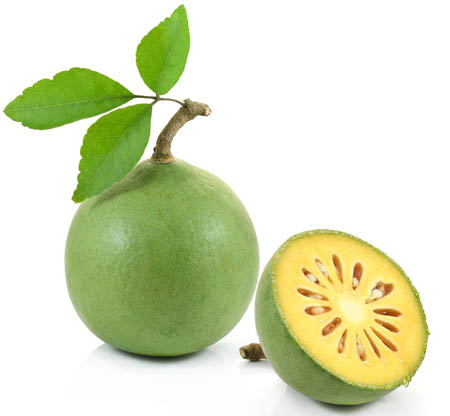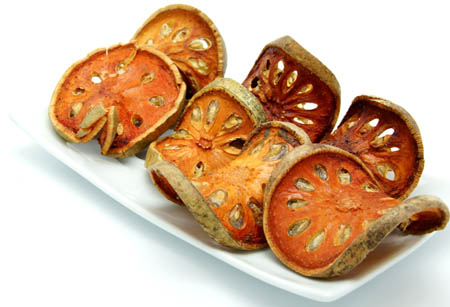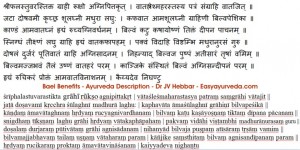Bael Root, Fruit, Leaves, Stem Uses, Research, Remedies, Side Effects
Bael tree is known as Bilva in Sanskrit. It is an ancient Ayurvedic tree with spiritual and medicinal importance. It is extensively described in Indian literature, since Vedic period. It is one among the Dashamoola herbs (Group of ten roots).

Botanical name is Aegle marmelos,
belongs to Rutaceae family (Jambira kula)
Table of Contents
Common names, Sanskrit synonyms
Hindi and English name – Bel, Bael.
Synonyms:
Maaloora – Alleviates all types of Mala dosha
Shandilya – Cure many diseases
Shailusha -Grows in hilly regions
Shriphala – Fruit of Bilwa is having Aroma
Gandhapatra -Leaves of Bilwa are aromatic
Sadaaphala – Bilwa bears fruits always
Mahakapittha – Fruit resemble large Kapitta fruit
Kantaki – Bilwa is thorny tree
Granthila – Stem is nodular
atasara – It has carminative action

Classical categorization
Charaka –
Shothahara – Group of herbs with anti inflammatory property
Arshoghna – Group of herbs useful in hemorrhoids
Asthapanopaga – Group of herbs useful in Basti treatment.
Charaka has mentioned it as a plant source for oil. (Reference) – Sthavara Sneha Yoni
Sushruta –
Varunadi, Ambashtadi, Brihat panchamoola, Dashamoola
Morphology / Habitat
Commonly found throughout India
Root – Tap root Branched
Stem – Erect, branched, Woody, cylindrical
Leaf – Palmately compound, trifoliate, petiolate, alternate, net veined, sessile
Inflorescence – Cymose, Axillary panicle
Flowers – Pedicellate, bisexual, sweet scented, 5 petals white in color
Fruit – Berry
Part used / Dose
Mula (Root)
Phala (Apakwa) – Unripe fruit
Patra – Leaves
Dose
Churna – (powder) – 1 – 2 g
Patra swarasa (Leaf juice) – 10 – 20 ml
Phytoconstituents
Marmelosin, Tannic acid, Fatty acids, Essential oils, Rutin, Aegeline, Marmesinin
Spiritual significance, Distribution
Spiritual significance: Bilva is called Shiva Druma. Its leaves are offered to Lord Shiva. As per Divine Park, offering of bilva leaf, with its three leaflets symbolizes – offering of “I, mine and ‘because of me’ ‘ types of egocentric attitude at the feet of the Lord(Reference: Divine Park )
Distribution: It is distributed throughout India.
Bilva Phala – Bael fruit Benefits – Sushruta Samhita

Charaka Samhita Sutrasthana 27
Unripe bael fruit
Kapha anila hara – balances Vata and kapha.
Teekshna (piercing)
Snigdha (unctuous, oiliness)
Sangrahi – Absorbent
Deepana – improves digestion
Katu, Tikta, Kashaya – has pungent, bitter and astringent taste
Ushna – hot
Young unripe bael fruits
Snigdha – unctuous, oily
Ushna – hot
Teekshna -Piercing
Pittavardhana – increases Pitta.
Deepana – improves digestion strength
Kapha Vatajit – Balances Kapha and Vata.
Ripe Bael fruit
Durjara – difficult for digestion,
Doshala – aggravates all the Doshas
Pooti Maruta – producer of foul smelling flatus.
Madhura anurasa – It has sweet aftertaste
Guru (heavy to digest)
Vidahi – causes slight burning sensation
Vishtambhakara – causes constipation. Useful in diarrhea and dysentery
Doshakrut – may cause imbalance of Tridosha, especially Vata.
Bael root
Tridoshaghna – balances Tridosha
Chardighna – relieves vomiting
Madhura – sweet
Laghu – light to digest
Qualities according to Kayyadeva Nighantu

Unripe fruit of Bael
Tuvara – Astringent
Grahi – absorbent
Ruksha – Dry
Agni Pittakrut – improves digestion and Pitta.
Vatashleshmahara – balances Vata and Kapha
Bael leaves
Bilva leaf is
Sangrahi – Absorbent
Vatajit – Balances Vata. Bael leaves are used in dyspepsia, gastritis indigestion, cold and sinusitis.
Bilva Root
Doshaghna – balancing Tridosha
Vamighna – relieves vomiting
Shulaghna – relieves abdominal colic pain
Bael Pith
Aegle marmelos (Bael) Pith is
Kaphavataghna – balances Kapha and Vata
Amaghna – relieves state of indigestion at the level of digestive tract and tissues
Shulaghna – relieves abdominal colic pain
Grahini – Absorbent
Bilwa Stem
Kasaghna – relieves cough, cold
Amavataghna – useful in rheumatoid arthritis
Hrudya – good for heart
Agnivardhana – improves digestion power – Carminative
Katu – pungent
Kashaya – astringent
Ushna – hot
Tikta – Bitter
Deepana, Pachana – Digestive, improves digestive enzymes
Snigdha (unctuous, oiliness)
Teekshna (piercing)
Bilva Flower
Atisarahara – Relieves dysentery and diarrhea
Trushahara – relieves thirst
Vamihara – antiemetic – relieves vomiting.
Oil derived from bael fruit pulp is hot in nature, and relieves Vata.
Bael fruit kept in sour gruel improves digestion power, acts as carminative.
Bael fruit oil benefits
To relieve chest congestion and cold, the Bael fruit oil is applied over the chest and forehead, over the sinus region.
It also relieves pain and inflammation.
It improves skin complexion.
According to Bhojana Kutuhalam 14th chapter, The unripe bilva stimulates the digestive fire, is heavy for digestion, unctuous and acts as absorbent. The ripe bilva fruit has madhura rasa as its secondary taste. It cures all the vitiation of three doshas, Bilva fruit dipped in kanjika helps in stimulating digestive fire, it acts as a cardio tonic, improves taste perception and helps in treating amavata.
How to preserve and use?
Bael leaves are used to prepare curries and Sambhar. If you are using the fresh leaves, taking it in that manner is helpful.
Bel Leaves, Bel Patra, Bilva Leaves Uses
Acharya Charaka explains Bilva leaves in the chapter of Annapana – food and drinks. It means that bilva leaves were used in cooking, 1000s of years before. It also indicates that bilva leaves, used in the form of powder or herbal tea are well tolerated by the body even in higher doses.
बिल्वपत्रं तु वातनुत्|
bilvapatraṃ tu vātanut| Charaka Samhita, Sutrasthana 27/107
Bilva leaves Balance down Vata Dosha.
In the treatment of jaundice,
ginger, black pepper and long pepper fruit powders – 1 teaspoon mix is administered along
with
15 ml of Bel leaf juice,
15 ml of juice of Aragwadha (Cassia fistula),
15 ml Amla juice
15 ml of sugarcane juice and
15 ml of Vidari juice (Pueraria tuberosa).
This is administered once or twice a day, on an empty stomach or before food. (Charaka Samhita, Chikitsa Sthana 16-58,59)
Bel leaves are added with water and boiled. Its steam is used for mild fomentation of eyes to relieve conjunctivitis with excess discharge (Kaphaja Abhishyanda) – Sushruta Samhita Uttara Tantra, 11/5
तत्पत्रं कफपित्ताभशूलघ्नं ग्राहि रोचनम् ||१५१||
tatpatraṃ kaphapittābhaśūlaghnaṃ grāhi rocanam ||151||- Sodhala Nighantu Guduchyadi Varga, 151
Bilva leaves are useful to relieve pain due to acid peptic disorder and weak digestion strength. Leaves are useful to relieve abdominal colic pain and inflammation associated with Kapha and Pitta aggravation.
पत्रं सङ्ग्राहि वातजित् ||१९||
patraṃ saṅgrāhi vātajit ||19||
Kaiyadeva Nighantu Oshadhi Varga 19
Its leaves are sangrahi – absorb excess water and are useful in Irritable bowel syndrome. It helps to improve the size and shape of feces
In case of muscle pain due to injury, its leaves are made a paste and applied externally.
How to use bel leaves?
In the treatment of headache, its leaves are mixed with lukewarm water, ground and paste is applied over the forehead.
In conjunctivitis, its paste is applied gently over closed eyelids.
Orally, its fresh juice extract is advised in a dose of 10 ml, once or twice a day, before food, for colic pain and IBS
Or its leaf decoction is prepared by boiling 20 grams of leaves in 2 cups of water, boiled and reduced to one cup, filtered and consumed lukewarm.
Ayurvedic medicines
Bilva is the first ingredient of the Dashamoola group of roots. This group represents potent anti-inflammatory activity that Bilva possesses.
Bilva is very useful in diarrhea and dysentery. Hence it is one of the essential ingredients in many Ayurvedic anti-diarrheal medicines such as Kutajavaleha and Brihat Gangadhara Churna
Bilva Tail – An oil prepared with bael root is used in ear diseases.
Vilwadi Gulika – a very useful Ayurveda medicine, with Aegle marmelos as the main ingredient, is used in insect bites, fever etc.
Bael leaves juice extract is used as an ingredient in making Astapatra taila, which is used in treatment of headache.
There are many research reports suggesting potent hypoglycemic activity of Bilva. Hence it is used in Ayurveda treatment of diabetes.
Dry bel fruits vs fresh fruits
In case of grapes, bael fruit and Haritaki (Harad fruit), – dried fruits are better than the fresh fruits.
Interaction with medicines, supplements
Can this be used while taking Homeopathic medicine?
Yes. This product does not react with homeopathic medicine.
Can this medicine be continued while taking supplements like multivitamin tablets, Omega 3 fatty acids etc?
Yes. Generally, this product goes well with most dietary supplements. However, if you are taking more than one product per day, please consult your doctor for an opinion.
With western
medicines
Seek your
doctor’s advice if you are taking this product along with other western
(allopathic / modern) medicines. Some Ayurvedic herbs can interact with modern
medicine.
If both Ayurvedic and allopathic medicines are advised together, then it is
best to take Allopathic medicine first, wait for 30 minutes and then take the
Ayurvedic medicine.
Systemic Action
External – Leaf has analgesic and anti-inflammatory actions. Leaf juice can be used as eye drops for conjunctivitis. Leaf paste can also be used for the same purpose. Its leaves are made hot and tied over the chest region in case of Parsvasula (Pain in the flanks due to pulmonary edema etc.)
Nervous system – Reduces the hypersensitivity of the nerves.
Digestive System – Unripe fruit has carminative, Digestive and Absorbent and Anthelmintic action. Ripened fruit is slightly purgative in nature. Overdose can lead to indigestion. Leaf juice is Liver stimulant and facilitates the secretion of bile. Root bark and Unripe fruit is indicated in Diarrhea, Loss of appetite, Malabsorption syndrome, Abdominal cramp etc. Unripe fruit along with jaggery can be given in Bloody diarrhea., Bleeding hemorrhoids, etc. Mature fruit is indicated in Constipation. Use of leaf juice with pepper is indicated in Jaundice and constipation. For the prevention of enteric fever daily consumption of fruit is indicated.
Circulatory System – Fruit has styptic action. Root bark and Leaf juice is indicated in inflammatory conditions.
Respiratory system – Leaf juice is useful in cough, rhinitis and other respiratory illnesses. Pacifies kapha dosha.
Excretory system – Leaf juice is indicated in Ikshumeha. Bark decoction with cumin powder and milk is beneficial in Sukrameha.
Reproductive system – Indicated in inflammatory diseases of female reproductive tract, Leukorrhea, Puerperal sepsis etc.
Tapakrama – Root and Leaf has Antipyretic property. (Root bark – Vishamajvara nasaka)
Satmikarana – Ripe fruit promotes body strength.











55 comments
vinu
Your website is awesome..I request you to write an article about Ayurvedic treatment of hyper sweating and body odor when you have time.
Dr J V Hebbar MD(Ayu)Author
Sure! Will write an article about it.
NB
Very Educative and informative. Thank you Sir.
Dr J V Hebbar MD(Ayu)Author
Hi, bael powder does help in colitis. You can purchase it from local Ayurveda store. If it is of uniform colour, without any microbial growth, has its typical odour, it is good.
Moderator -BST-
For chronic ulcerative colitis which form of bael is recommended? ripe or unripe? if unripe increases pitta how can ulcerative colitis patient take it since they are all high pitta patients? Can you please explain. Many thanks Dr!
Dr J V Hebbar MD(Ayu)Author
Bael root or stem bark decoction is used.
rachana
is there any side effect of it
Dr J V Hebbar MD(Ayu)Author
Overdosage may cause constipation in a few.
dilshad qureshi
Bael powder can help for hair loss?
Dr Malini Bhat
Dear sir, No it does not.
Rony dut
Having a raw green beal leaf can cause lmpotence in men??
Dr J V Hebbar MD(Ayu)Author
No.
B K Sahib
Thankyou Sir for informative website.
dr gajanan wayal
its dr wayal,chikhali,dist buldana,state maharashtra….Hi sir your article is very very usefull..and in future i will always look for ur article. thanks
Dr J V Hebbar MD(Ayu)Author
Dear Dr Gajanan Wayal, Greetings! Thanks for your kind words of appreciation.
Rahul
sir please tell the company name of Bilva Avaleha
Dr Malini Bhat
Dabur manufactures Bilvadi Avaleha
Dr J V Hebbar MD(Ayu)Author
Hi, ripe bael fruit is hard to digest and may increase Vata Dosha. Hence, it is best to stop consuming ripe bael fruit.
dr rajan datar
Hi Doctor,
very informative and helpful. please keep writing more about helpful home remedies for the benifit of the common man.
Good luck !
Dr Rajan Datar.
Dr J V Hebbar MD(Ayu)Author
Thank you sir. Will surely continue. 🙂
Shivani
Any tips on how I can cure Arthritis?
Louisa
Thankyou for sharing all your knowledge. I history of constipation and have used a fibre blend with cascara segrada for many years and now find that i am addicted. Bael has been helping me wean myself off my fibre. I do 3 days of bael leaf 300mg ( bowel care by organic india..approx 3 or 4 tablets per day) then back to the fibre. I have been searching the internet to see if bael is addictive like all the irritants such as senna and cascara but cannot find much on long term use. Bael has been a life saver for constipation and my swollen belly is also much much better.
Any information is greatly appreciated
Louisa
Dr J V Hebbar MD(Ayu)Author
Hi, bael is not addictive.
Prakash Bems
Bael, would make one impotent, is that true?
Dr J V Hebbar MD(Ayu)Author
NO.
Dr Mini
Respected Sir,
I always read ur articles in leisure time ( many a times i go through them repeatedly). I love all the articles esp the references mentioned by u as cross checking it helps me to clear my queries.
Thanks alot doc for all the awesome articles
Dr J V Hebbar MD(Ayu)Author
Dear Dr Mini,
Greetings!
Went through your website. Impressive work! 🙂
Will try to refer patients, whenever I get opportunity.
Best regards
Dr Hebbar
Dr J V Hebbar MD(Ayu)Author
Hi, the effect of bael or any fruit may differ from person to person.
For example, cucumber may worsen cold in few, and it does not in some other.
jayshree
does bael tree cure urine infection and kidny problem?
Kumar
Hello doctor. Thank you for sharing your valuable knowledge. What is the benefit of bael fruit oil? Can consuming bael fruit oil help control diabetes? Are there any benefits of applying this oil on skin? I have purchased your ayurveda book but nothing mentioned about the oil. I would greatly appreciate your thoughts on this. Thank you!
Dr J V Hebbar MD(Ayu)Author
To relieve chest congestion and cold, the Bael fruit oil is applied over chest and forehead sinus region.
It also relieves pain and inflammation.
It improves skin complexion.
I have not seen this used for oral consumption.
Kumar
Thank you so much doctor!
Pankhuri
Hello,
I’m in my first trimester and craving bilva juice with sugar. Is it safe for me to consume? Some websites say it will help with morning sickness and make me healthy , is that true?
Dr J V Hebbar MD(Ayu)Author
You can take it for 2 – 3 weeks time.
Murthy
Im also using this.But how long I should use this?
Dr J V Hebbar MD(Ayu)Author
It can be continued for 6-8 weeks time
Dr J V Hebbar MD(Ayu)Author
It can be boiled to prepare herbal tea and consumed.
sudha s
Thank you doctor for painstakingly providing information and answering questions
Dr J V Hebbar MD(Ayu)Author
Welcome.
Shaan
Is the seed of bel fruit useful in diarrhea?
Dr J V Hebbar MD(Ayu)Author
Yes.
Aparna
Sir does intake of bael leaves causes infertility in women.
Dr J V Hebbar MD(Ayu)Author
No.
Raje
Dear Doctor
My personal experience is after taking ‘Patanjali Bael Churna’ blood sugar go reduced.
I am not diabetic.
Vaidya Khadiwale (Pune) suggested bael leaf kadha for diabetics.
Here is youtube link, its in Marathi.
https://youtu.be/nLujZxPmvKo
Swati Balar
Please guide how to use unripe bel for constant loose stools. And how much quantity too please
Dr J V Hebbar MD(Ayu)Author
1 tablespoon once or twice a day.
Kavi
Sir, i have ulcers in intestine but no loose motion. Also have swelling in stomach lining. Which brand bael tablet should i use?
Dr J V Hebbar MD(Ayu)Author
Bhumija lifesciences Bael capsule can be a good option. Please consult a doctor directly.
Malathi
Namaste Doctor, you have mentioned that ripe fruit increases all three doshas. But the ripe fruits are used to prepare panaka and considered as pittahara. Is it wrong?, Thank you.
Dr J V Hebbar MD(Ayu)Author
Namaste. While preparing Panaka (coolant drink), adding jaggery, etc. coolant substances makes it Pittahara.
sumit bhattacharya
Hello Sir,
In ayurveda bilva leaf asava or aristham is not. I find they use bael giri.